-
15 January 2024 | Policy Analysis
Physicians pushing back against overtime hours in hospitals
7.6. Health system efficiency
Efficiency is not systematically monitored in the Czech health system, though a few studies have researched and assessed efficiency of selected sectors, such as inpatient providers (Dlouhý, Jablonský, & Novosádová, 2007; Mastromarco, Šťastná, & Votápková, 2019). Vrabková & Vaňková (2021) particularly focused on human resources while measuring efficiency of select inpatient care providers.An amendment to the Labour Code (Act No. 262/2006 Coll.) became effective on 1 October 2023, transposing the EU Directives on work-life balance for parents and transparent and predictable working conditions into Czech law. Among other changes, the amendment (Act No. 281/2023 Coll.; specifically addressing health workers in the Labour Code) substantially increased the maximum number of overtime hours for physicians and paramedics.
Prior to the amendment, employers could unilaterally enforce up to 150 overtime hours per year (maximum 8 hours per week) on physicians or up to 416 hours (maximum 8 hours per week) with their consent. This was often not enough to cover continuous hospital operation, and many physicians had parallel contracts with providers for additional overtime hours (in the form of an Agreement to perform work (DPČ), which are officially for different work as having two contracts for the same activity with one employer is illegal).
Thus, the number of agreed-upon overtime hours for physicians was to be raised to 832 per year (1,040 for paramedics) for the next five years with the rationale of bringing overtime work out of legal grey zones into standard employment contracts. The reform’s authors also stressed this only applied to agreed-upon overtime hours; the 150 hours to unilaterally enforce remained the same. Simultaneously, the plan was to further improve health system efficiency over the five years and eliminate the long-term need for so many overtime hours.
However, the changes proved unpopular, with physicians arguing in particular that their younger colleagues needing their employer’s support during their residency training would be left with particularly little negotiating power to refuse overtime hours. The representatives of the Young Doctors Section of the Czech Medical Chamber presented their objections, arguing that the increase to 832 agreed-upon overtime hours would adversely affect the quality of care provided as well. In an effort to bring the government to the negotiating table, an initiative, “Physicians are just people” (“Lékaři jsou jenom lidi”) emerged in August 2023, whose main speaker became the Chairman of the Young Doctors Section of the Czech Medical Chamber (a professional organization with obligatory membership, not a labour union) (Lékaři jsou jenom lidi, 2023).
By September 2023, the initiative declared that over 4,000 physicians were prepared to terminate their contracts for voluntary overtime hours in the absence of serious negotiations with the Ministry of Health and the Ministry of Labour and Social Affairs (responsible for the Labour Code). When Czechia’s Chamber of Deputies nevertheless passed the amendment to the Labour Code to take effect on 1 October, the initiative called upon physicians to terminate their contracts for voluntary overtime hours from December 2023: an estimated 6,000 hospital-employed physicians then terminated these contracts (the number of physicians employed in hospitals is approximately 21,000) (ÚZIS, 2022).
On 5 September, the Board of the Czech Medical Chamber unanimously adopted a resolution supporting the initiative and its goals (ČLK, 2023). The labour unions expressed their support in September as well. On 18 September, labour unions (Healthcare and Social Care Union of the Czech Republic, Trade Union of Doctors in the Czech Republic) signed a joint appeal with the Young Doctors Section of the Czech Medical Chamber that was presented to the Ministry of Health (NaseZdravotnictvi.cz, 2023).
Negotiations with the Ministry of Health lasted from October to early December 2023. Apart from reducing the maximum number of agreed-upon overtime hours, the protesting physicians demanded better working and training conditions and systematic changes to the health system to decrease any future need for so many overtime hours. Furthermore, demands over remuneration (for physicians and other health sector workers) became part of the debate. The Minister of Health offered to increase the payments from health insurance funds to providers through the Reimbursement Directive for 2024, though this had no mechanism to ensure that this money would be allocated to remuneration (health workforce wages are up to the providers’ discretion). On 30 November, the prime minister stepped in and guaranteed that the promised increase in reimbursement would be allocated to workers’ remuneration in all inpatient facilities within the statutory health insurance system (including the private and regionally owned ones, not only in facilities subordinated to the Ministry of Health). The General Health Insurance Fund (VZP) followed suit and declared it would facilitate this promise and redistribute additional funds through bilateral agreements with all inpatient facilities.
On 8 December, the following was agreed upon by the representatives of the Ministry of Health, VZP, Healthcare and Social Care Union of the Czech Republic, Trade Union of Doctors in the Czech Republic and the Czech Medical Chamber:
- To reduce overtime work of physicians, medical and non-medical workers by
- rolling back the number of maximum annual overtime hours from the amendment to the Labour Code,
- looking for ways to rationalize providers’ networks and improve the organization of work, both in cooperation with the relevant stakeholders,
- preparing legislation on healthcare workers’ remuneration effective from 2025 (in the spirit of the not-yet-fulfilled promises on increased remuneration made by the government in 2012 after the “Thank you, we’re leaving” initiative of physicians), and
- analysing information on violations of the Labour Code and other labour regulations in hospitals.
- To improve training conditions by
- setting up a coordinator position overseeing residency training in each directly subordinated hospital,
- creating a contact point for complaints about non-compliance with the terms and conditions of residency training,
- enacting paid leave from work before the state field exam (at least 5 days) and the state licensing exam (at least 10 days), and
- discussing proposals for long-term changes in physicians’ training with all relevant stakeholders.
- Increase monthly salaries in facilities subordinated to the Ministry of Health for
- physicians, dentists and pharmacists between CZK 5,000 to CZK 15,000 depending on their level of education, and
- other hospital employees by 5%. To achieve this, the Reimbursement Directive for 2024 was increased by CZK 6.8 billion (around EUR 280 million).
- An additional CZK 3 billion (around EUR 120 million) with which hospitals pledge to use to increase workers’ remuneration. This will be paid for in 2024 by VZP. All inpatient providers (including private and regionally owned facilities) in the VZP network are to sign contract addenda agreeing to use the money exclusively for remuneration.
Immediately after this, the protesting physicians were urged by their leaders to continue with overtime work unless they had already surpassed the annual limit for overtime hours (Ministry of Health, 2023).
The updated amendment of the Labour Code became effective on 28 December 2023 (Act No. 413/2023, Coll.), decreasing the maximum number of overtime hours that the employer and employee can agree upon back to the 416 hours per year. Furthermore, the amendment newly allowed employees in hospitals and paramedics to work 24-hour shifts if they agree. In particular, the shift can last a maximum of 12 hours, possibly followed by overtime hours (before this, 8 hours per shift was the standard maximum). If a health worker now works a 24-hour shift, they would then have to rest for at least 22 hours.
References
ČLK, Czech Medical Chamber (2023). Physicians are just people. [Lékaři jsou jenom lidi.] Statement released on September 5, 2023. Available at https://www.lkcr.cz/aktuality/100420cs-lekari-jsou-jenom-lidi.
Lékaři jsou jenom lidi (2023). Accessed on January 7, 2024, at https://lekarijsoujenomlidi.com.
Ministry of Health (2023). Today, the Minister of Health signed an agreement with representatives of health workers and VZP, which sets out further steps in the areas of education, working conditions and remuneration. [Ministr zdravotnictví dnes podepsal dohodu se zástupci zdravotníků a VZP, která nastavuje další kroky v oblastech vzdělávání, pracovních podmínek a odměňování]. Press release issued on December 8, 2023. Available at: https://www.mzcr.cz/tiskove-centrum-mz/ministr-zdravotnictvi-dnes-podepsal-dohodu-se-zastupci-zdravotniku-a-vzp-ktera-nastavuje-dalsi-kroky-v-oblastech-vzdelavani-pracovnich-podminek-a-odmenovani/.
NaseZdravotnictvi.cz (2023). Representatives of the Section of Young Doctors of the Czech Medical Chamber and healthcare labour unions jointly handed over the demands to the hands of Minister Válek. He supposedly has a solution. [Zástupci Sekce mladých lékařů ČLK a zdravotnických odborů předali společně požadavky do rukou ministra Válka. Ten údajně řešení má.] Press, September 19, 2023. https://nasezdravotnictvi.cz/aktualita/sekce-mladych-lekaru-clk-predala-se-zdravotnickymi-odbory-pozadavky-do-rukou-ministra-valka-ten-udajne-reseni-ma-ale-pocat-si-musime-do-rijna.
ÚZIS (2022). Czech Health Statistics Yearbook 2021. [Zdravotnická ročenka České republiky 2019]. https://www.uzis.cz/res/f/008435/zdrroccz2021.pdf.
7.6.1. Allocative efficiency
The term allocative efficiency refers to the notion that society’s limited resources are being used in such a way that they best satisfy the population’s needs and wants. As regards health, this is usually interpreted as the allocation of resources between various levels and types of care consistent with what is in society’s best interests (namely, maximizing health improvements). Levels of allocative efficiency may relate to the allocation of resources to the health system; the allocation of resources to different types of providers; the allocation of resources to different types of services; and the allocation of resources for public health.
The share of public expenditure on health in Czechia is relatively high (81.5% in 2019; Table3.1) and health service provision is not reliant on private OOP payments, though public expenditure allocations to health can be sensitive to economic downturns. As described in Box3.3, a risk-adjustment reform in favour of an increase of allocative efficiency occurred in 2018. As such, the PCG risk-adjustment mechanism now considers not only age and sex, but also chronic conditions. It avoids cream-skimming and reallocates funds among HIFs in a fairer way.
| Table3.1 | Box3.3 |
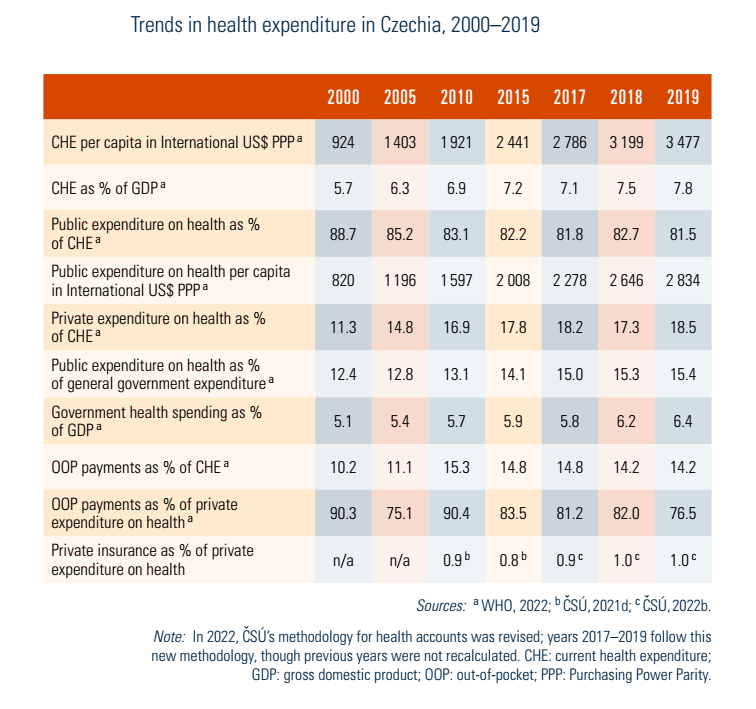 | 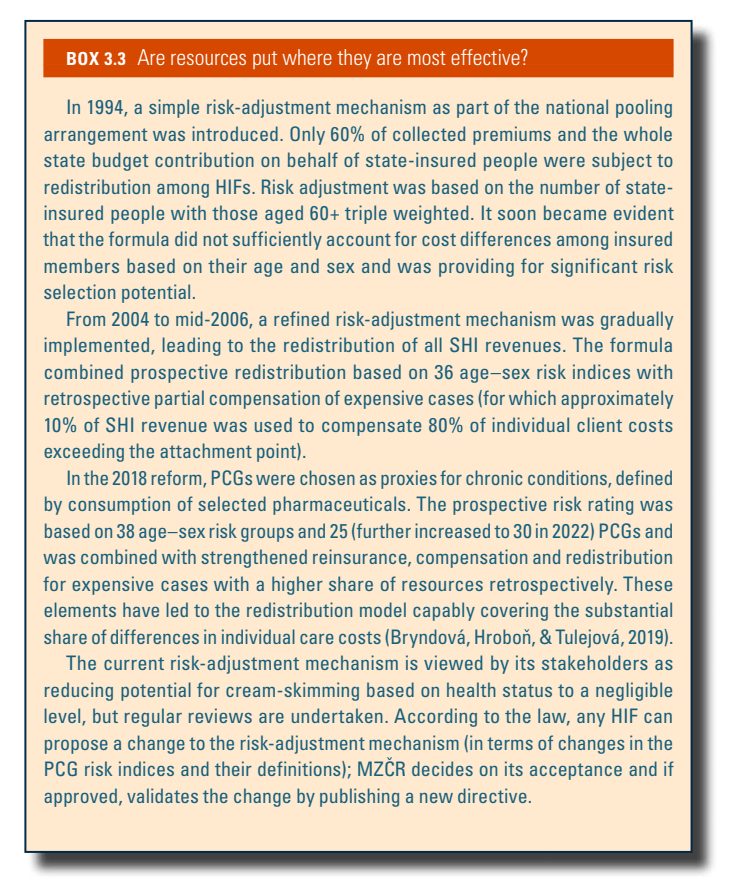 |
7.6.2. Technical efficiency
Considering the low share of current health expenditure as a percentage of GDP in Czechia and the high reliance on public financing, technical efficiency of the health system (that is, the extent to which a health system secures the minimum levels of inputs for a given output) can be represented by looking at levels of amenable mortality with current health expenditure per capita, which shows Czechia in an improving position (see Fig7.9).
Fig7.9
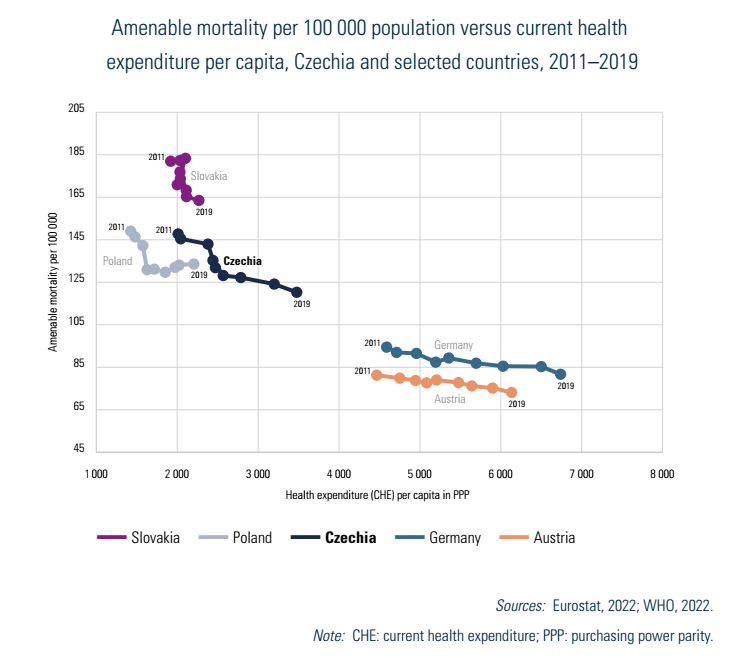
There are nevertheless areas for improving technical efficiency in the Czech health system. First, while the number of beds in acute care has been steadily decreasing (Fig4.1), occupancy rates have been relatively stable over time, decreasing slightly in recent years. The average length of stay has been stable since 2012 and is still higher than in other EU countries (Eurostat, 2022).
Fig4.1
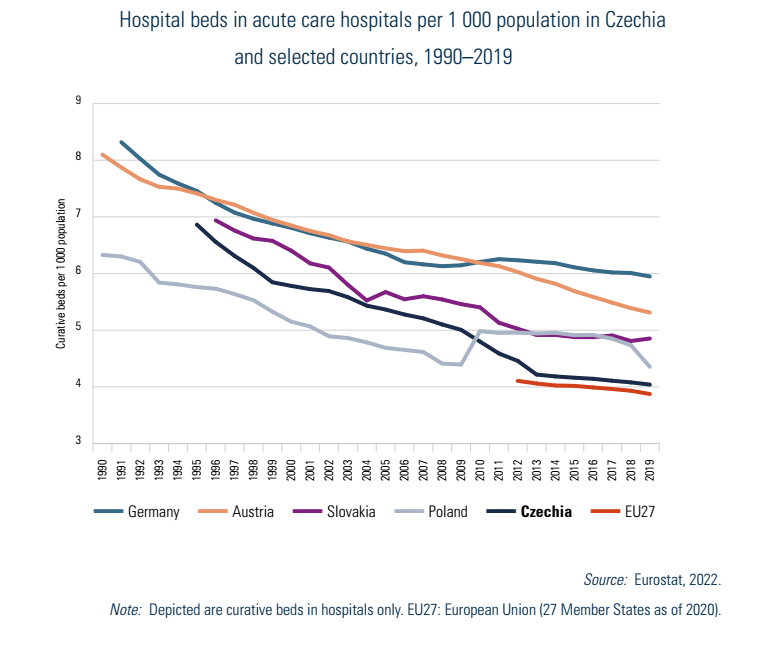
Second, while the number of inpatient hospital discharges per 100 000 inhabitants decreased by 1.4 over the last decade, the number of discharges is still among the highest in the EU (Eurostat, 2022). The number of outpatient consultations is also among the highest compared with other countries and even increased in recent years (Eurostat, 2022).
Additionally, although the number of practising nurses and physicians reaches EU averages, both physicians and nurses are often overworked and work extra hours that are still not sufficiently remunerated, particularly in inpatient care (see section 4.1). Administrative burden is a particular problem for physicians and as a result, there are regions that suffer from a lack of medical professionals, as they go abroad for better pay and work conditions (moving there or as commuters). This is particularly a problem in regions bordering Germany and Austria (see section 4.2.3). In some cases, hospital wards in border regions have had to close, and others have closed temporarily during summer, due to lack of personnel.
Finally, overspending on pharmaceuticals is still a concern in Czechia. Fig7.10 shows the development of pharmaceutical expenditure and consumption between 2010 and 2019. Even though total packages sold slightly decreased during the observed period, the amount paid for pharmaceuticals gradually rose. Generic substitution in pharmacies has been allowed since 2008, though there is only limited information on the share of generic pharmaceuticals. Determinants of generic substitution in pharmacies, that is, dispensing of a generic pharmaceutical if a non-generic medicine was prescribed, were explored by Votápková & Žílová (2016) and the scope for efficiency improvements in this area was established.
Fig7.10
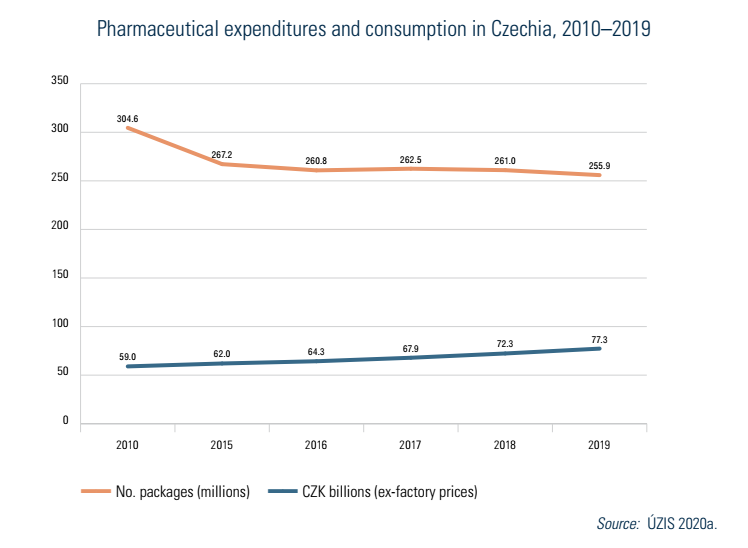
As regards user fees, the effect of inpatient user fees in Czechia was empirically tested by Votápková (2020), whereas the effect of user fees in outpatient care was assessed by Zápal (2010) and Votápková & Žílová (2016). The results did not yield strong evidence for user fees in decreasing overutilization of services; most fees being phased out by 2014 and no new policies discouraging overutilization have since been announced. The inefficient use of resources and overconsumption of health services remain two important challenges facing the Czech health system in terms of technical efficiency.
